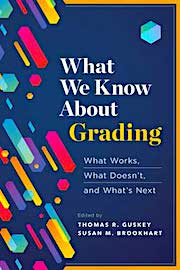 I hope the title of this blog post caused you to click on the link with an intent to read it! I was originally inspired to write this after reading an excellent article at Edutopia by teacher David Cutler titled “Tips for Allowing Test Retakes.” Cutler explains why he allows students to take retests and submit late work.
I hope the title of this blog post caused you to click on the link with an intent to read it! I was originally inspired to write this after reading an excellent article at Edutopia by teacher David Cutler titled “Tips for Allowing Test Retakes.” Cutler explains why he allows students to take retests and submit late work.
Teaching consultant Rick Wormeli, author of the bestselling Fair Isn’t Always Equal (2nd Edition, 2018), influenced this grading policy after Cutler heard him speak about grades and fairness. Afterwards, Cutler dialogued with Wormeli and what he said stuck with Cutler:
A kid doesn’t do an assignment, no matter how large, and so I just give him a zero? He doesn’t get competent. He remains incompetent. Is that really the legacy I want to carry forward? Incompetence, but be able to tell all my colleagues in the larger society, ‘Oh, I caught him. He couldn’t get past me with missing a deadline, let me tell you.’
Or should it be, ‘Hey, you screwed up, child. Let me walk side by side with you and develop the competence and the wisdom that come from doing something a second and third time around, where you’ll get your act together.’ Both of those are greater gifts in the long run than simply labeling a child for a failed deadline.
 My own general interest in the issue of grades was heightened after participating in a two-day professional learning session with Tom Guskey. Guskey also worries that grades can provide a disincentive to students, particularly if they receive a bad grade or a zero early in the semester. How can they recover?
My own general interest in the issue of grades was heightened after participating in a two-day professional learning session with Tom Guskey. Guskey also worries that grades can provide a disincentive to students, particularly if they receive a bad grade or a zero early in the semester. How can they recover?
And, what happens if they have mastered the learning at the end of the semester? Does the bad grade they received early in the semester when they didn’t understand the concept blunt the fact that they now understand and could possibly “ace the test?”
To demonstrate his point, he used a college football analogy, something very popular in our state.
He asked us to imagine following two freshman quarterbacks, both vying for the starting position through spring training and the preparation up to the first game. Guskey described “Quarterback 1” as a near disaster on the first day of spring practice. He threw several interceptions, got confused by several plays, and ran an incorrect pattern.
 “Quarterback 2” was more proficient and was considered by the coach at that time as the better candidate for the job, demonstrating what Guskey described as a solid “B” performance.
“Quarterback 2” was more proficient and was considered by the coach at that time as the better candidate for the job, demonstrating what Guskey described as a solid “B” performance.
Through spring practice and the weeks leading up to the first game, however, Quarterback 1 improved dramatically. His passing accuracy soared, and he not only understood the plays, but executed them well. Equally important, he gained the respect of his teammates.
The coach watched him grow from what might have been an “F” or a “D” grade on the first day of practice to an “A” the week before the first game. Quarterback 2, however, continued to be a solid “B” player. He neither improved nor declined.
If the football coach used the rule of averages, and included the weak performance of Quarterback 1 during his first days of practice, Quarterback 2 would be named the starting QB. But, would that be the best choice?
The Grading Debate: No Easy Answers
Balancing grading with incentives for students to grapple and learn even the hardest material is a dilemma that has no easy answers. But we must address the issue if we want more students to be successful. And, isn’t that what we want? Don’t we want more students to become successful, productive adults?
When I think about this issue of grading, I’m reminded of the world outside of education. When I make a mistake, let’s say a typo or misspelling, I’m not given a bad grade and told to move on. No, I correct it and hopefully remember to do a better job proofing or noting how to correctly spell the word.
 And, I suspect the same is true for teachers. If you design a lesson that doesn’t go well, you don’t give yourself an “F,” you adjust it. And, there are countless examples ranging from coming to a meeting unprepared to missing an important deadline. In most cases, we’re not fired or disciplined, but expected to do better the next time, or finish the project, etc.
And, I suspect the same is true for teachers. If you design a lesson that doesn’t go well, you don’t give yourself an “F,” you adjust it. And, there are countless examples ranging from coming to a meeting unprepared to missing an important deadline. In most cases, we’re not fired or disciplined, but expected to do better the next time, or finish the project, etc.
We learn to be responsible by being given opportunities to be responsible. And, when we’re not responsible, there should be consequences. But, those consequences ought to help us move forward and correct or address our mistakes instead of penalizing us in ways that might very well cause us to fail again.
In Outliers, Malcolm Gladwell told stories about the 10,000 hour rule, identified in a study by Anders Ericsson. People at the top of their trade, whether it is the Beatles, Michael Jordan, or an acclaimed scientist, perfect their knowledge and skills through hard work and practice that lasts at least 10,000 hours over time. I suspect when the Beatles initially started playing together, no one would have predicted their fame later on! But their time in small nightclubs in Liverpool and Hamburg set the stage for their “overnight success” on the Ed Sullivan Show.
We can think of countless examples of this try-stumble-try-again phenomenon as celebrated people have worked to become accomplished. Yet somehow we expect students to quickly master subjects. And, when they don’t, we penalize them with a bad grade. And, instead of giving them the opportunity for a “do-over” to get it right, they are told to move on.
That’s not how the real world works.
What about Accountability?
If you’ve read the blog this far, I suspect you are wondering about student accountability. I’m all for it! What if schools or districts formed a study committee made up of teachers, students, and maybe a few parents. What if the purpose was to create policies that encouraged learning AND student responsibility? That might be a good project that would pay dividends for students – and teachers – far into the future. It might break through the emotional logjam that grading has become.
More Resources for Reflection and Discussion
►”A Perfect World Is One with No Grades” – Susan M. Brookhart is one of education’s most respected experts on grading and assessment, with bestselling books like How to Use Grading to Improve Learning (ASCD, 2017), What We Know About Grading (ASCD, 2019) with Thomas R. Guskey. This “Best of 2019” article in ASCD Express begins:
In a perfect world, there would be no grades. Instead, there would be feedback to students from teachers and others, coupled with opportunities to use the feedback to improve both performance and understanding.
Is that perfect world here now? Unfortunately, no. Grades of some sort—whether that means proficiency levels, A–F scales, or percentages—are necessary in most school settings for administrative functions that come with doing education at scale.
► “Students Should Not Believe a Grade Defines Who They Currently Are” – Many of us are familiar with Larry Ferlazzo’s Classroom Q&A column at Education Week, featuring the opinions of many leading educators on a variety of topics. Ferlazzo’s series on grading (November 2019) included a short essay from school data expert Doug Reeves, in which he said:
Grading is an emotional issue in many schools, and it can seem overwhelming. It doesn’t have to be that way. Just TWO simple changes make a huge difference in student results. (Scroll down to find out what they are!)
►Effective Grading Practices – It’s been nine years since Educational Leadership magazine devoted a full issue to grading. Sadly, perhaps, this impressive collection of articles is still timely and includes insightful articles by Gaskey, Wormeli, Brookhart, Reeves, Fisher & Frey and many others. From the issue’s Introduction:
There is no doubt that our society believes in grades. We look for four-star movies, five-star restaurants, top-10 colleges, and even Grade A eggs. Although we tend to think of these ratings as objective, we know that it’s important to read the full reviews—and look for cracks in the shells….
Most of us agree that if grades are going to be meaningful, they must be as accurate and fair as possible. The question before us is, How do we make that happen?
UPDATE!
Since this post was written in early March 2020, Educational Leadership has published a new issue devoted to assessment and grading – Grade Expectations – and it’s excellent! Click here to visit the Table of Contents and discover publicly available articles and other articles for ASCD members and EL subscribers (now could be the time?).

0 Comments on "Is School About Grades or Learning and Mastery?"